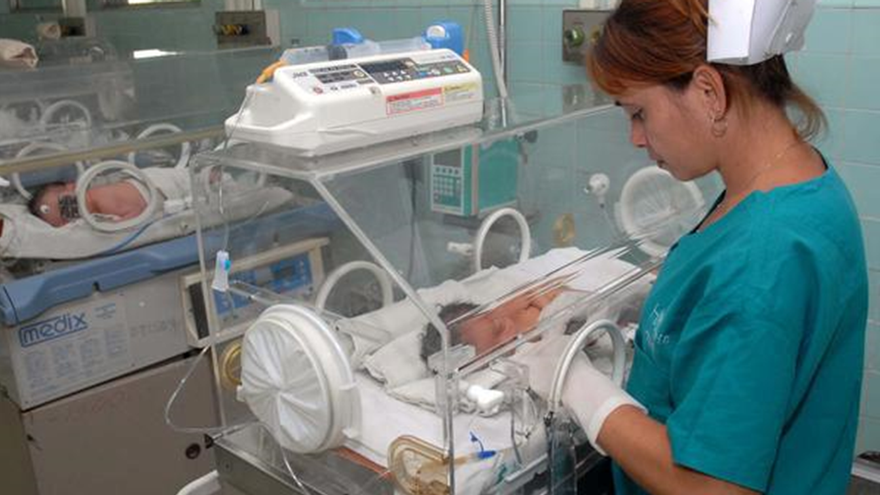
![]() 14ymedio, Madrid, 8 April 2022 — The infant mortality figures in Ciego de Ávila were very bad news last year, when the province closed 2021 with a rate of 13.8 dead babies per thousand births. For the first quarter of 2022 up to March 24, according to the authorities, six newborns died and there were 911 births, a mortality rate of 6.6 per thousand, Invasor reports this Thursday.
14ymedio, Madrid, 8 April 2022 — The infant mortality figures in Ciego de Ávila were very bad news last year, when the province closed 2021 with a rate of 13.8 dead babies per thousand births. For the first quarter of 2022 up to March 24, according to the authorities, six newborns died and there were 911 births, a mortality rate of 6.6 per thousand, Invasor reports this Thursday.
The official newspaper, which interviewed the director of Health in Ciego de Ávila, Nilka Pita Alemán, said that the outlook is bleak if one starts from there. “For the start, these numbers are not encouraging either, especially when the country’s purpose is not to exceed, as a rate, four deaths per thousand in 2022,” says the text, which as the only positive data reveals that there has been no maternal death.
The official outlines a problem: the exodus of Cubans leaving the Island is influencing the lack of specialized health professionals in the maternal and child area. Although there are obstetricians, there is a lack of pediatricians and clinicians, whose functions are being covered by general practitioners. “It happens that the very dynamics of the sector implies ups and downs in what we now consider an achievement, whether, for example, due to the exodus or maternity leave,” she explains.
Pita Alemán says that secondary care is the area with the worst situation, since it is impossible to cover the shifts. “Three people are needed to guarantee the third medical criterion and define the conduct. (…) Also, the number of nurses available is few,” she warns. As a consequence, neonatologist nurses and even intensive care nurses have had to change positions. “This year in the plan we request more places for nurses, in the medium-technical modality to guarantee speed in training,” he adds.
The specialist points out as a worrying cause the data that indicates that the number of babies born with low weight are increasing, although they survive longer than expected with those ranges. As the doctor explains, work has been done to improve the application of the protocols that control those born with low birth weight and the results are relatively positive.
“To date we have regressed in terms of low birth weight, we have 19 more children than in the same stage of the previous year. According to experts, this condition is exponentially proportional to death.
Pita Alemán says that the state authorities traveled to the province at the end of the year to discuss what was failing and, from there, the staff was trained to change some things. One of the factors that has been monitored the most in pregnant women as a result of this is heart disease and anemia, she reveals, since there is high maternal morbidity in women with these pathologies.
The specialist also points out that strategies are reviewed, such as checking whether women need income or material support due to their economic situation, as well as cases of teenage pregnancies. “We know that part of the success lies in increasing control over the processes, the clinics and the maternity homes,” she says.
Pita Alemán reveals that at the end of the year there was an outbreak of sepsis at the Antonio Luaces Iraola Provincial Hospital that led to the death of several children. The poor conditions of hospitals, especially with regard to hygiene, have been pointed out for a long time by the independent press, but the authorities have a hard time accepting that these conditions are the cause of deaths, as in this case
“In the Neonatology room, difficulties related to water, leaks in the delivery rooms and cesarean sections were eliminated,” says the official, who assures that the problems are being solved and there are better conditions, also in terms of sanitary material, but lacking is “the control so that everyone complies with what is established.” As an example, she gives the Morón hospital, where there was also an outbreak of sepsis that was resolved without deaths.
“When a lack of control or administrative negligence has been demonstrated, severe measures have been taken, among them, the removal from their posts of people in charge and specialists,” says the expert.
The interview corroborates what Ernesto René exposed in December in a comment on Invasor. René, a worker in the Pami maternal and child program for 34 years, spoke about the precarious situation of the project, due to disinvestment and lack of professionals “due to policies and decisions of its directors in the province, in a totally mistaken way and lacking in science and experience.”
“Valuable professionals such as obstetricians, pediatricians or clinical nurses, from primary and secondary care, have not been looked after and I believe that the motivations and barriers of the personnel who work in this sensitive area should be reviewed.”
____________
COLLABORATE WITH OUR WORK: The 14ymedio team is committed to practicing serious journalism that reflects Cuba’s reality in all its depth. Thank you for joining us on this long journey. We invite you to continue supporting us by becoming a member of 14ymedio now. Together we can continue transforming journalism in Cuba.
